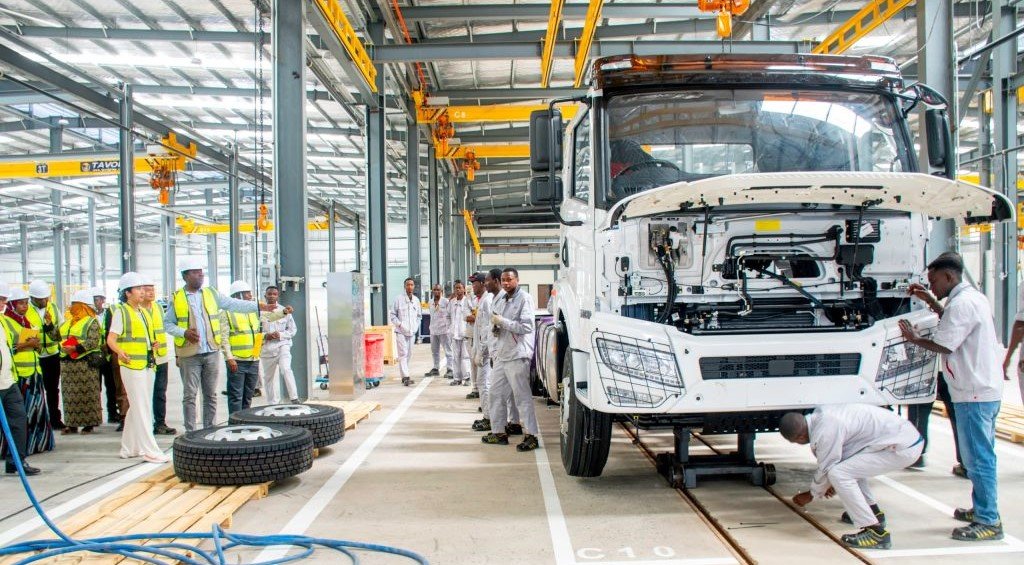The Strategic Importance of the FAW-Rostar Assembly Plant in Bagamoyo to Tanzania’s Economy

With a capacity of up to 2,000 vehicles annually, this project isn’t just about trucks, it's about laying the groundwork for a competitive, diversified, and self-sustaining economy.
Tanzania has taken a bold step in industrial development by partnering with FAW Jiefang of China and local firm Rostar Vehicle Equipment Ltd to launch East Africa’s largest FAW vehicle assembly plant in Bagamoyo, in the Pwani Region. With a capacity of up to 2,000 vehicles annually, this project isn’t just about trucks, it's about laying the groundwork for a competitive, diversified, and self-sustaining economy. This are the importance of the launch of this FAW assembly plant in Tanzania economy;
1. Industrialization Catalyst
The assembly plant directly supports Tanzania’s Third Five-Year Development Plan (FYDP III) goals, which prioritize manufacturing and industrial job creation. This investment contributes to the country's vision of shifting from an agriculture-based to an industrial economy. This will help to trigger local part manufacturing and SME growth. For example in South Africa, the automotive sector contributes 6.4% of GDP driven by local and foreign vehicle assembly.
2. Employment and Skills Development
The factory has already created 250 direct jobs and an estimated 1,800 indirect jobs. More importantly, Tanzanians are being trained in advanced techniques: welding, vehicle coating, quality control, and testing. This builds a technically capable workforce, essential for industrial competitiveness. Also, this plant already has partnered with University of Dar es salaam to train Engineer students and impart skills needed in automative industries.
3. Boost to Regional Logistics and Trade
Located near the Kwala Dry Port and Bagamoyo Special Economic Zone, the plant will position Tanzania as a logistics and distribution hub for East and Central Africa. This makes it cost-effective to export assembled vehicles to Rwanda, Burundi, DRC, Zambia, and Malawi. This will be enhancing Tanzania’s manufacturing footprint and trade influence.
4. Import Substitution and Forex Savings
Assembled vehicles locally reduce the need for importing complete built units (CBUs), saving on foreign exchange and reducing trade deficits. Over time, sourcing even basic components locally could further increase value retention.
5. Foundation for Future Local Manufacturing
While the plant currently assembles CKD (completely knocked down) kits, it can evolve into full manufacturing with engine and parts production. A strong local supply chain can eventually emerge if the right policies are implemented. Fox example India’s automotive industry began with assembly in the 1950s but is now the world’s 4th largest car producer.
What Tanzania Can Do to Protect and Promote This Investment;
1. Having Policy Stability and Investment Security
Tanzania government should ensure long-term legal protections for industrial investors and offer predictable tax and business environments. This will make this investor to think in shifting to manufacturing than assembly on. Example: Rwanda’s zero-tolerance policy on corruption and policy consistency has helped attract Volkswagen and other global auto brands.
2. Develop a Local Parts Manufacturing Ecosystem
The governments should put more efforts to Support local Smaal and Mediums enterprises (SMEs) to engage in producing and supply vehicle parts like seats, batteries, plastics. The government can offer grants, tax breaks, and training for local industrial entrepreneurs to achieve this millestone. Forexample; South Africa has over 400 auto-parts manufacturers, thanks to incentives like the Automotive Production and Development Programme (APDP).
3. Promote Made-in-Tanzania Vehicles
The government should Launch national campaigns to promote locally assembled FAW trucks for public sector and private use forexample by offer preferential procurement for government fleets, making tax relief to buyers of these faw truck made in Tanzania. Example: Ethiopia’s government mandates local procurement from domestic assembly lines like Bishoftu Automotive, building local industry demand. Also use this to Publicize success stories from Bagamoyo to global investors via embassies, expos, and digital platforms.
This FAW-Rostar project is a strategic economic initiative, not just an assembly line. It accelerates industrialization and if protected, supported, and marketed well, Tanzania can turn Bagamoyo into an African automotive corridor, attracting more manufacturers, boosting exports, and moving closer to becoming a competitive industrial economy.
